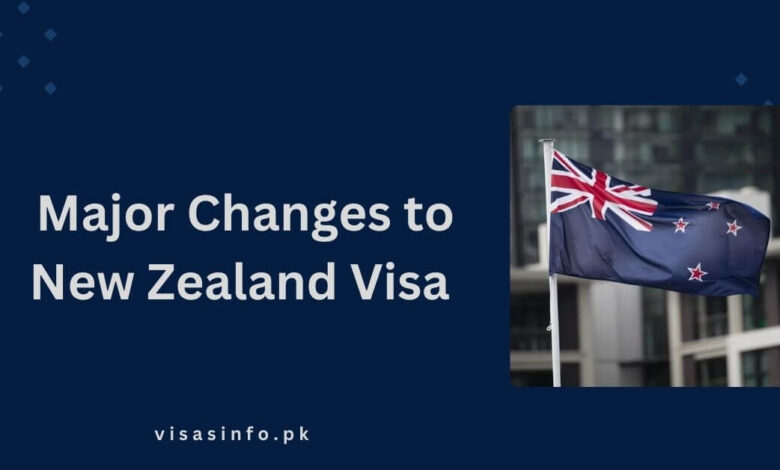Major Changes to New Zealand Visa System – 2024

The New Zealand government is implementing modifications to the nation’s visa policy in order to enhance company productivity and provide a greater number of highly qualified personnel to bolster the country’s economic growth. This post will provide a comprehensive overview of the significant changes that the New Zealand government is implementing to the country’s visa policy for 2023.
The government acknowledges the obstacles that New Zealand enterprises face in recruiting international labor in this competitive labor market. The government’s initiatives to attract skilled migrants to New Zealand are being guided by the necessity of assisting in attracting more highly qualified applicants to address labor shortages. This is being achieved by establishing a more robust competitive edge.
The following are the substantial changes to the New Zealand visa process:
Applications are now being accepted for work-to-residence visas.
Applications for residence permits under the sector agreements and green list are currently being accepted under the labor-to-residence visa. A visa for transportation personnel or a work permit for caregivers An immigrant may petition to become a resident of New Zealand if they possess the requisite skill and pay levels or have completed two years of qualifying work experience in a sector agreement or green list employment.
To submit a visa application, they must also have met the remaining common prerequisites, which are as follows:
- First and foremost, maintaining optimal health
- Additionally, the possession of moral integrity
- Furthermore, speaking English fluently
- Additionally, be of a specific age.
The Green List has been updated to include new roles.
The Ministry of Business, Innovation, and Employment will include 17 positions in the green list as a result of a systematic and targeted review. Further information, such as the specific requirements for each role and the designated residency pathway, will be published as the implementation date approaches. The roles will be added to the green list in March 2024.
Applications for the Work-to-Residence Pathway are now being accepted.
Applications for the positions that are currently listed in the sector agreement The green list and the work-to-residence pathway are currently being accepted. Foreign nationals who have worked for two years in a position that qualifies for a qualifying sector agreement or is on the green list and who meet the age, health character, and English language competence requirements are now eligible to apply for residency.
Recognized an increase in the employer and seasonal cap.
Under the Recognized Seasonal Employer (RSE) scheme for the 2023–2024 season, a maximum of 19,500 employees, which is 500 more than the previous year, may be employed. The wine and horticultural industries will receive labor from workers from partner Pacific nations if local labor is insufficient, as a result of the increased RSE limit.
This year’s increase is a reflection of the industry’s need for access to a broader pool of laborers and the impact on the New Zealand labor market.
New roles have been incorporated into the Construction and Infrastructure Sector Agreement.
The agreement regarding the building and infrastructure sectors will also include new employment at the beginning of the following year. As the commencement date of the plan approaches in the subsequent year, additional information will be made accessible. The sector agreement will encompass the subsequent position, and additional details are anticipated.
- Drilling assistant
- Earthmoving Laborer
- Earthmoving machinery general operator
- Controller of vehicular traffic
- Assistant mechanic
- Marker for the line
- Operators of machines
Wage Requirements for the Green List Work-to-Residence Visa
Individuals who are applying for a work-to-residence visa must satisfy the job-specific, income threshold, or green list role requirement that was in effect at the commencement of the 24-month work experience and at the time of the residency application. When they reapply for the visa or change employment, they will be required to satisfy the new criterion if the median income increases during their 24-month work experience.
Persons who submit for a work visa or a vital purpose visiting visa that permits them to work before September 29, 2023, are exempt from this requirement. In this instance, individuals who possess a work visa issued by a recognized company are not exempt; rather, they are only required to receive the median income at the time of their residence permit application.
Skilled Migrant Visa Changes in New Zealand | Receive Direct PR
On October 9, 2023, the skilled migrant category resident visa for New Zealand became available for application. It provides a straightforward point system that establishes a distinct skill requirement for residency and provides applicants with numerous opportunities to exhibit their proficiency. This article will examine the most recent updates and benefits of the skilled migrant category resident visa, as well as its specifics.
The skilled migrant category resident visa is an excellent option for professionals who wish to maintain a fixed residence and employment in New Zealand. Candidates will be required to accumulate a total of six points to be granted residency under the new methodology.
Acquiring Points
Points can be earned for a variety of things, such as New Zealand occupational registration, income from a position, or an offer that must be at least 1.5 times the median pay in New Zealand, among other requirements. A bachelor’s degree or higher is required.
In addition to these prerequisites, candidates may also include points for their age, employment history, and the qualifications and experience of their companions. The SMC visa is available to all individuals, and there is no restriction on the number of visas that may be issued. Nevertheless, to be considered for admission, applicants must satisfy all eligibility criteria.
Check Also: New Zealand Visitors Visa – Apply Now
Modifications to the Skilled Migrant Visa
The experienced migrant category’s resident visa has undergone the following recent modifications:
- Initially, applicants must accumulate additional points through qualified work experience in New Zealand if they fail to accumulate sufficient points through one of the skill streams.
- Additionally, before submitting a residency application, all applicants must have a solid employment offer from New Zealand, and the majority must work there for a specific period.
- In addition, the new regulations will not impose a limit on the number of individuals who can transfer, provided that they possess the necessary skills.
- Furthermore, employers may continue to employ workers in New Zealand on temporary work visas, such as the certified employer work visa, or on alternative work visas, such as the working holiday visa, although they do not satisfy the residency requirements.
- A more straightforward point system will be implemented as a result of these modifications, which will establish a clear competence threshold for residents and offer individuals a variety of methods to demonstrate their skill level.
Modifications to Interim Visas
On October 9, 2023, the requirement for applicants of skilled migrant category resident visas to renew their temporary visas while they await the outcome of their application was eliminated, and a new temporary visa became effective for requests for residence visas under that category. This supplementary service is provided to visa holders as they progress toward residency.
These modifications also pertain to the spouses and dependents of applicants for resident visas in the skilled migrant category. While the interim visa is still in effect, applicants are permitted to depart New Zealand and return while the skilled migrant category interim visa has multiple entry travel requirements.
Interim skilled migrant visa holders will also have the ability to modify certain conditions of their transitory visas through a mechanism. If their circumstances alter, applicants will be able to modify the conditions of their temporary visa with greater confidence as a result of these modifications.
Variation of Conditions (VCs)
Interim visas in the skilled immigrant category are governed by the circumstances of the application and the conditions of the current interim visa.
- Benefits of the SMC Visa
- The SMC Visa offers several principal advantages, including:
- Permanent residence and employment are still permissible in New Zealand.
- Additionally, you are permitted to travel to New Zealand with your spouse and any dependent children.
- Additionally, New Zealand’s public healthcare and educational systems are accessible.
- Additionally, after four years of permanent residency in New Zealand, it is possible to apply for citizenship.
More information is accessible on the Immigration New Zealand website. If you are interested in applying for the SMC Visa, you may also consult with an immigration attorney.
Benefits of Major Changes to New Zealand Visa
- Streamlined Application Process: The introduction of new visa categories and a simplified application process can reduce the time and effort necessary to obtain a visa. This facilitates the relocation of entrepreneurs, investors, and skilled workers to New Zealand.
- Enhanced Emphasis on Investment and Skills: New Zealand is prioritizing visas for individuals who have investments and skills that contribute to the country’s economy. This helps attract talent and investment that supports economic growth and development.
- Clearer Pathways to Permanent Residency: New visa changes frequently include more explicit pathways to permanent residency. For instance, certain work visas may facilitate a more straightforward transition to permanent residency, thereby ensuring long-term stability for immigrants.
- Flexibility for Employers: Employers may have greater flexibility in hiring qualified workers from abroad as a result of modifications to work visa regulations. This is especially advantageous in industries that are experiencing labor shortages.
- Enhanced Job Market Matching: The introduction of new visa categories has the potential to more effectively align the talents of immigrants with the requirements of the New Zealand job market. This ensures that expatriates are placed in positions that are compatible with their areas of expertise.
- Investment Incentives: Investors may find that modifications to visa policies provide more appealing incentives and terms. This has the potential to stimulate additional investment in New Zealand’s real estate and enterprises.
- Support for Innovation and Entrepreneurship: New visa options frequently include provisions for entrepreneurs and startups, which promotes the development of businesses and innovation in New Zealand.
- Enhanced Regional Opportunities: Certain modifications may involve providing incentives for migrants to reside and work in regional regions, thereby addressing labor shortages and promoting regional development.
Frequently Asked Questions:
-
What is the new visa rule for New Zealand?
New Zealand has tightened work visa rules in response to “unsustainable” migration levels, say authorities. Low-skilled applicants now need to meet English-language requirements and have a three-year stay, which was previously five years.
-
What is the new immigration policy in New Zealand?
The government’s changes to the scheme would include introducing English-language requirements for low-skilled jobs and setting a minimum skills and work experience threshold for most employer work visas. The government will also reduce the maximum continuous stay for most low-skilled roles from five years to three years.
-
Is a New Zealand visa difficult?The positive news is that the process of applying for a New Zealand tourist visa for Indians is relatively straightforward. With the electronic visa (e-visa) in place, there is no longer a need to go through cumbersome paperwork or wait in a long queue. You can get it done online through ACKO.



